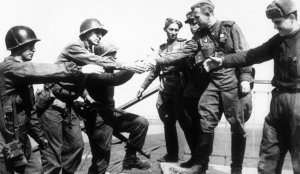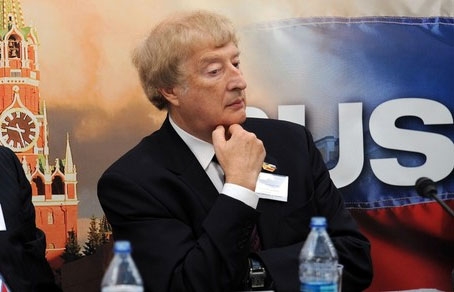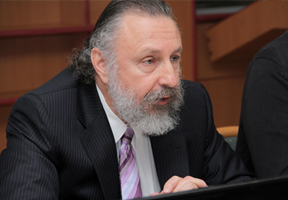
 The surrender of Nazi Germany to the victorious Allies 72 years ago this week reminds us of what Americans and Russians can accomplish when we work together against a common enemy. We are now beginning to see some small signs that Washington and Moscow may finally be making a start in that same spirit against the threat of radical Islamic terrorism.
The surrender of Nazi Germany to the victorious Allies 72 years ago this week reminds us of what Americans and Russians can accomplish when we work together against a common enemy. We are now beginning to see some small signs that Washington and Moscow may finally be making a start in that same spirit against the threat of radical Islamic terrorism.
The surrender of Nazi Germany to the victorious Allies 72 years ago this week reminds us of what Americans and Russians can accomplish when we work together against a common enemy. We are now beginning to see some small signs that Washington and Moscow may finally be making a start in that same spirit against the threat of radical Islamic terrorism.
Let’s remember that throughout the 2016 campaign then-candidate Donald Trump repeatedly voiced the need to get along with Russia. He noted that Russia was fighting the Islamic State and other jihadists in Syria. "We will seek friendship and goodwill with the nations of the world – but we do so with the understanding that it is the right of all nations to put their own interests first.We do not seek to impose our way of life on anyone, but rather to let it shine as an example for everyone to follow,” said Trump in his Inauguration speech.
For Trump’s opponents, these thoughts confirmed their accusations that he was Vladimir Putin’s puppet, the "Siberian Candidate.” Many of his supporters saw it as part of his America First policy, the end of regime changes abroad, foreign nation-building and unnecessary wars.
Unfortunately, the direction Trump had signaled in 2016 didn’t materialize in 2017. Perhaps daunted by critics determined to block any possible US-Russia rapprochement, the first three months of the current administration were framed by the same anti-Russian rhetoric that characterized that of Barack Obama and the campaign of Hillary Clinton. Things got even worse with the April chemical weapons attack in Syria, which the US immediately and without evidence blamed on Syrian government forces supported by Russia. Prospects increased for American and Russian direct military confrontation.
During his trip to Moscow last month, Secretary of State Rex Tillerson told Putin that the "relationship between our two nations was the lowest it’s been since the Cold War and it’s spiraling down, it’s getting worse… . . the two greatest nuclear powers in the world cannot have this kind of relationship. We have to change it.” According to Tillerson, the Russian president nodded in agreement.
Change seems to be happening, however slowly. Most importantly, Washington and Moscow appear to be returning to the need to find common ground on Syria. In particular, the United States now seems to be prepared to cooperate, on some level, with an arrangement for safe zones jointly guaranteed by Russia, Turkey, and Iran. While fraught with difficulties and potential for renewed conflict, the arrangement may finally set the stage for progress towards a political settlement to the Syrian war and common action against the Islamic State, al-Qaeda, and their allies.
However, Trump should be prepared for disruptions by his opponents, who openly call for fierce resistance to all his ideas and initiatives, especially to any steps towards US-Russia reconciliation. The Democratic losers in the 2016 elections and some Republicans who viciously attacked Trump during the campaign are in search of enemies, while the President and his team are searching for friends.
There are many special interest groups in our country who place their narrow goals and ambitions above the interests of American people. These groups, aided by the mainstream/fake news media, do not care about the misery and destruction around the world or the cost to America in blood and treasure caused by our misguided foreign policy since collapse of USSR. For them Russia is more useful as an enemy than as a friend.
Even before the Soviet collapse and for years after – and particularly following the 9/11 attacks – the Russians sent strong signals to Washington about their desire to become America’s most loyal friend and ally only to be constantly rebuffed. Trump can change that.
In a 2007 interview with the German magazine Der Spiegel the Nobel laureate Alexander Solzhenitsyn said: "Of course, Russia is not a democratic country yet. It is only starting to build democracy and it’s all too easy to take it to task with a long list of omissions, violations and mistakes. But did not Russia clearly and unambiguously offer its helping hand to the West after Sept. 11? Only a psychological inadequacy or a disastrous shortsightedness can explain the West’s irrational refusal of this hand.”
Let us be clear. Even if successful, a US-Russia joint victory over the terrorists in the Levant may not be the equivalent of May 1945. But it is a necessary start for the one bilateral international relationship we cannot afford to get wrong if life on this planet is to continue.
By Edward Lozansky and Jim Jatras
 Edward Lozansky is president of the American University in Moscow, Professor of Moscow Sate and National Research Nuclear Universities. He is the author of the book "Operation Elbe”, which describes joint US – Russia anti-terrorist efforts.
Edward Lozansky is president of the American University in Moscow, Professor of Moscow Sate and National Research Nuclear Universities. He is the author of the book "Operation Elbe”, which describes joint US – Russia anti-terrorist efforts.
 Jim Jatras is a former U.S. diplomat and foreign policy adviser to the Senate GOP leadership. He is the author of a major study, "How American Media Serves as a Transmission Belt for Wars of Choice”.
Jim Jatras is a former U.S. diplomat and foreign policy adviser to the Senate GOP leadership. He is the author of a major study, "How American Media Serves as a Transmission Belt for Wars of Choice”.



.jpg/250px-ElbeDay1945_(NARA_ww2-121).jpg)





